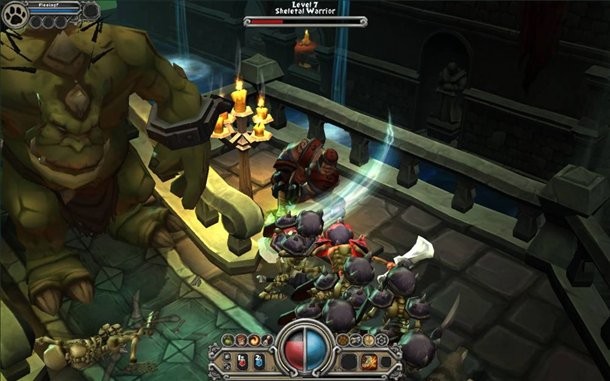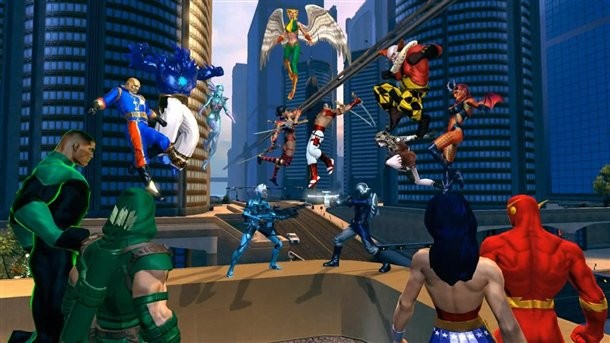Most Anticipated PC Games Of 2011

There's little arguing that 2010 was one of the best years PC gaming has seen in some time. Between extremely successful major releases like StarCraft II and Civilization V and surprising indie hits like Minecraft and Amnesia: The Dark Descent, there was study buzz for a consistent stream of excellent releases throughout the whole year. 2011 will hopefully continue that trend with a mix of huge games and strange but potentially awesome smaller releases. Here's a look at the games that have intrigued us the most so far for the coming year.
Torchlight II (TBA 2011)
If for some reason Diablo III doesn’t make it out in 2011 (see below), then at least we should have Torchlight II to fall back on. Coming from a lot of the team members who worked on the extremely promising, tragically shuttered Mythos, the first Torchlight came out of nowhere and completely quenched our thirst for hacking, slashing, and looting for a short time. The sequel looks to continue bringing the goods, including the addition (thank the gods!) of multiplayer, the only seriously painful missing element from the original. (Image above from the original Torchlight)
Bloodline Champions (Q1 2011)
Technically, you could already be playing Bloodline Champions, since it has entered open beta. With a game that’s so based around balancing, though, it may be better to wait until the final release. The easiest way to think of Bloodline Champions is as a faster-paced, more action-packed version of DotA. Or perhaps with Blizzard announcing at Blizzcon that they’re not going to focus on competitive play with Diablo III, you could think of this as your go-to arena-based action RPG. Either way, you pick from one of 16 bloodlines, jump into battle against an opposing team, and create some carnage.
Venetica (January 11)
If nothing else, this European action-RPG has a unique core concept: Players take on the role of Death’s daughter in 16th century Venice, where she must journey around the city completing quests to help take down a powerful necromancer who opposes the order placed on the world by her father. Reviews from the early European release of the game have been a little wary, but I want to see the game for myself and find out if there’s anything awesome to be gleaned from the interesting plot and setting.

DC Universe Online (January 11)
Surprise! Anyone who’s read our pre-beta preview coverage of DCU or heard it discussed on Respec Radio knows that we’ve been highly critical of this upcoming superhero MMO’s chances of being good. Then we got into the beta and discovered that it’s looking a lot more impressive than we had thought. SOE still has a lot to prove -- I’m still not sure how long the fast-paced, beat-em-up-style gameplay will feel fresh or how it will translate into a traditional MMO endgame -- but at the very least, I’m now going to be giving it a try.
Bulletstorm (February 22)
Like many of the entries on this list, Bulletstorm will be making its way to consoles as well, but with a developer known for intense, fast-paced PC shooters like People Can Fly, I fully expect the PC version of Bulletstorm to be incredible. The regular gory shooter formula gets taken over the top in this game by scoring players on their kills, giving them bonus points for everything from skillful headshots to humiliating takedowns such as kicking the enemy into a cactus.
Darkspore (February)
Ignore the name: Darkspore doesn’t have much to do with Maxis’ previous high-concept god game. This time around, the team founded by Will Wright is trying their hand at a Diablo-style hack-and-slash. Unlike traditional action-RPGs, you’ll build up characters by piecing together strands of DNA, and you’ll be able to switch between any character in your squad at any time. These shake-ups could be just the ticket to propel us through another endless loot hunt.

Gray Matter (February)
It’s not common for an adventure game to get us excited these days, but Gray Matter has several GI staffers curious thanks to the involvement of Gabriel Knight veteran Jane Jensen. With a lengthy and troubled development history and a North American release that still keeps getting pushed back despite the game being out in Europe, Grey Matter could easily prove to be bad. But a supernatural mystery written by Jane Jensen? It’s hard for someone raised on Gabriel Knight: The Beast Within to not get excited about that.
Shogun 2: Total War (March 15)
The original Shogun started the Total War series back in 2000, and since then it’s become one of the most-respected strategy franchises in existence. Now Creative Assembly is returning to the game that started it all. With gameplay more tightly focused on the politics between warring factions in 16th century Japan, Shogun 2 also throws historical hero units into the mix as powerful wild cards in battles. Naval combat returns and huge battles will stretch across the Japanese countryside, promising to keep strategy fanatics busy all year long.

Rift (Early 2011)
We play enough generic fantasy MMOs every year that it takes something special to stand out and make us want to level up yet another elf. Rift may just have that something special in the form of randomly spawning portals (known as “rifts,” believe it or not) that dynamically morph the world around them. Adding this interesting wrinkle and some beautiful graphics onto the well-worn MMO formula of dungeons, questing, and PvP could make for a surprisingly strong contender in a packed genre.
Portal 2 (April 20)
Valve blew gamers away with the original Portal in 2007 as a short pack-in with Half-Life 2: Episode 2 and the Orange Box. Now this puzzle-focused first-person title is getting a chance to stand on its own in a full-length game. Normally I’d be worried about a studio trying to take an idea that worked so well in such a small helping and stretching it out, but it’s freakin’ Valve. They’ll make it work. And on top of the single-player experience, we’ll be able to break our brains even more in a new co-op mode.
Stronghold 3 (April)
Although never quite critically acclaimed, the Stronghold series has always provided a unique spin on the real-time strategy genre by focusing on castle sieges and defense. The latest attempt will return to the series’ roots after the generally disliked Stronghold 2. Developer Firefly Studios has added in more realistic physics as well as a user-friendly UI.

The Witcher 2: Assassins of Kings (May 17)
The Witcher is quite possibly one of the most underrated RPGs of this generation, so you’d better believe I’ll be singing the praises of its sequel if it lives up to the first game’s quality. The developer seems intent on improving minor quibbles with the first game, such as creating a more stable engine and getting the dialogue to flow more naturally. I almost even want this promising sequel to make the journey to consoles so a wider audience has a chance to discover it. Almost.
Star Wars: The Old Republic (Spring)
Star Wars Galaxies, the first attempt at an MMO set in George Lucas’ ever-expanding sci-fi universe, was an abject failure, but The Old Republic looks like it will have a much better shot at not letting us down. When I played this ambitious project at for the first time at this year’s E3, I described it as "what would happen if Mass Effect and World of Warcraft had a baby." Some gamers may flinch at that thought for various reasons, but Old Republic really seems to combine the best of BioWare’s past efforts with lessons learned from Blizzard’s behemoth MMO.
Rage (September 13)
If you need any reason to be excited about Rage, look no further than the developer. This studio created Wolfenstein, Doom, and Quake. They are essentially responsible for setting the stage where first-person shooters have arguably become the most popular genre on the market. Rage is the first fully-realized new IP from id since the mid-90s, but it sees the developer tackling a new post-apocalyptic setting with the addition of RPG and racing elements. Oh, and it’s the debut of one of the most impressive game engines ever seen.

Diablo III (TBA)
Do I really need to explain why this one is exciting? Blizzard pretty much never releases a bad game, which is probably why we’ve been waiting 10 years now for the sequel to the game that taught many of us how crazy in love we were with cutting down monsters to get mountains of loot. We don’t know for sure that Diablo III will make it in 2011 -- especially since Blizzard did the unimaginable and released two new games in a single year in 2010 -- but it sure would make for a great, sleepless few months.
Guild Wars 2 (TBA)
The original Guild Wars surpassed our expectations in 2005 both by being a very good MMORPG and by not having a monthly fee. Guild Wars 2 is likely to continue both of those legacies, but it’s also turning several other MMO conventions on their head. Healing classes? Developer ArenaNet doesn’t think they’re particularly fun to play, so they’re out. Death penalties? Same business; gone. This is another game where we aren’t sure if it will actually come out in 2011, but hopefully we’ll be seeing a lot more of it in the coming year either way.

Get the Game Informer Print Edition!
Explore your favorite games in premium print format, delivered to your door.
- 10 issues per year
- Only $4.80 per issue
- Full digital magazine archive access
- Since 1991









